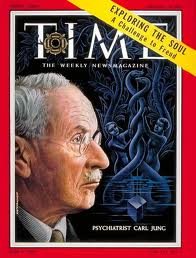 Carl Gustav Jung was a human-enigma, even to himself. During the last 6 years of his life he described himself as “complicated phenomenon.” A razor-sharp intellectual, innovative theorist, and high-profile psychoanalyst whose work bi-directionally resonates through the corridors of time, history, and myth. Simultaneously, with a feature article entitled "Medicine: The Old Wise Man" and his picture being on the cover of Time Magazine (February 14, 1955 Vol. LXV No. 7), some people condemned him as womanizer, recluse, and even anti-Semite; he is a figure that has been a focal point of controversy both during his life and long-after. Jung was born on July 26, 1875 in Kesswil, Switzerland, a town of mostly fisherman and farmers. Jung was the only surviving child of Paul Jung, a Protestant minister, and Emilie Preiswerk. The Preiswerks were Swiss citizens related to the vom Tieg, an ancient royal family from Basel, while the Jung’s were Germans exiles whose ancestry included a later conversion from Roman Catholic to Protestant in the 1700's. At the tender age of four years old the Jung family moved to Basel; soon after, Paul began teaching his son Latin. Carl’s gift for language would prove lasting; he would eventually master a variety, including English, French, ancient Greek, and Sanksrit. Jung was an introverted child possessed of great intelligence. In other words, Carl was a walking bull’s-eye for any playground bully. Indeed, while attending a boarding school in Basel, his classmates tormented the timid Jung who typically played alone. In Deirdre Bair's book "Jung: A Biography," she writes the “... parents of the village children deliberately kept them away from the odd little boy, whose parents were so peculiar” (p. 22). After matriculating from the Humanistisches Gymnasium, the bullying Jung endured culminated in a traumatic incident when, at age 12, a classmate shoved him so hard he was knocked unconscious. Carl began to faint frequently for years afterward and later described the experience as a childhood neurosis. Jung’s grandfather had been a professor of surgery at the University of Basel. Despite C. G. Jung’s first inclination toward a career in archeology, the very realistic young man realized that such a profession would never provide him the job and financial security he needed. Jung eventually picked medicine at the University of Basel which included both an M.D. degree and a doctorate allowing him to be accepted as an academic with the title of Privat-docent in Psychiatry at the University of Zurich (Dissertation, “On the Psychology and Pathology of So-Called Occult Phenomena”. Jung’s most significant mentorship came after he graduated, taking he took a staff position at the Burghölzli Mental Hospital in Zurich under the tutelage of Eugen Bleuler. There he also achieved world acclaim as research scientist in Psychiatry performing pioneering studies on the Word Association Test.
0 Comments
Your comment will be posted after it is approved.
Leave a Reply. |
On Smartphones, click on the above form and enter your blog in the "COMMENT" section.
Archives
June 2014
CategoriesAll Child Psychology Consciousness Development Dreams Ego Fixation Freud Fromm Hillman Hyperactivity Incest Individuation Intellect Jung Books Articles Mandala Self Spirit Taoism The Four Functions Unconscious Visions Seminar Word Association Test Working With Images |
 RSS Feed
RSS Feed
